【备战2023】中考英语一轮复习教材回扣课件(人教版七年级下U1-U6)
文档属性
| 名称 | 【备战2023】中考英语一轮复习教材回扣课件(人教版七年级下U1-U6) | 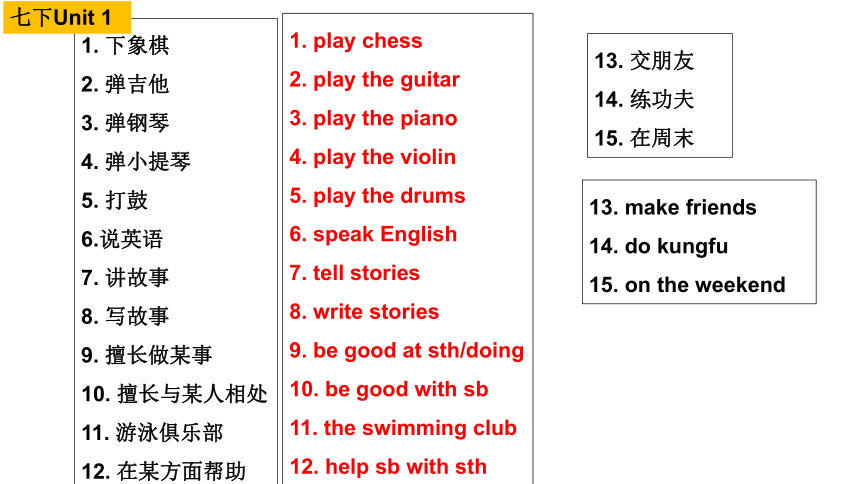 | |
| 格式 | ppt | ||
| 文件大小 | 346.5KB | ||
| 资源类型 | 试卷 | ||
| 版本资源 | 人教新目标(Go for it)版 | ||
| 科目 | 英语 | ||
| 更新时间 | 2022-07-01 13:56:10 | ||
图片预览

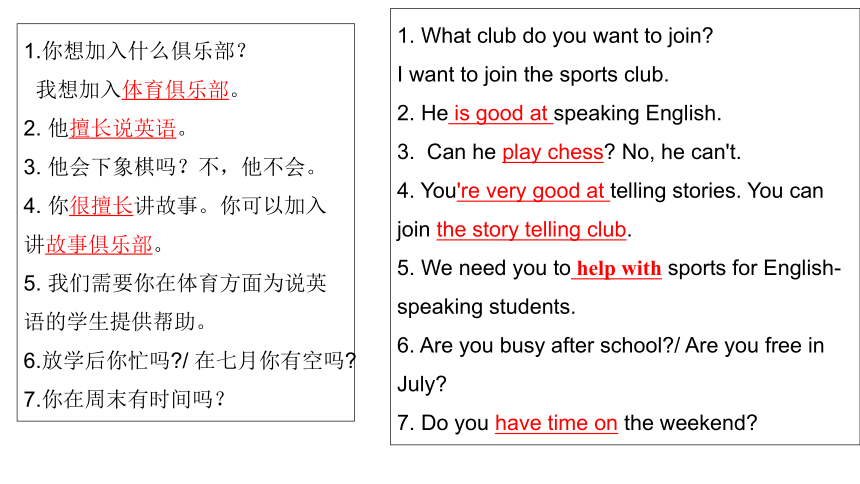
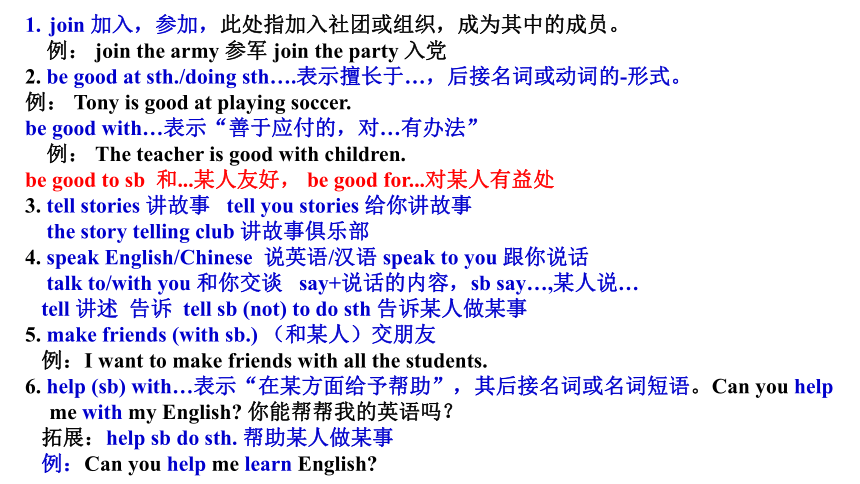
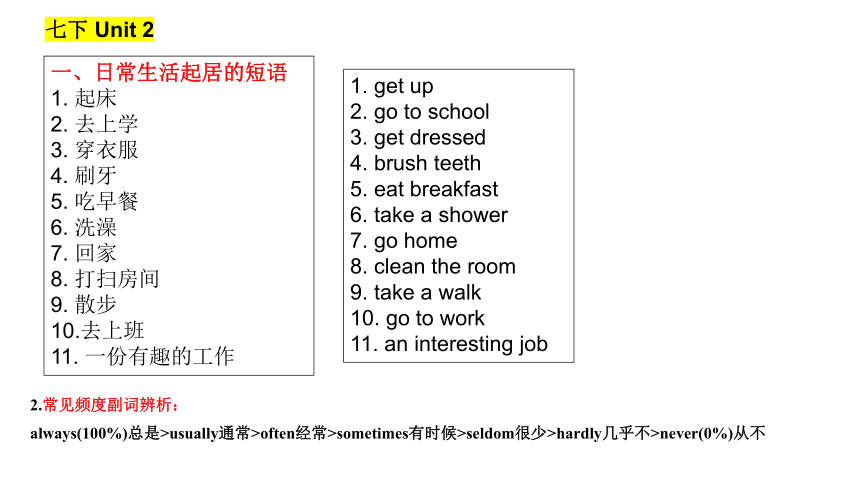
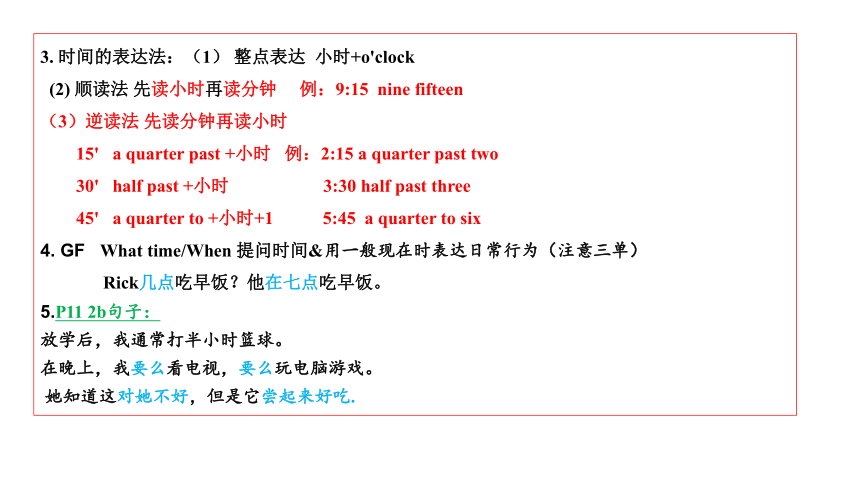
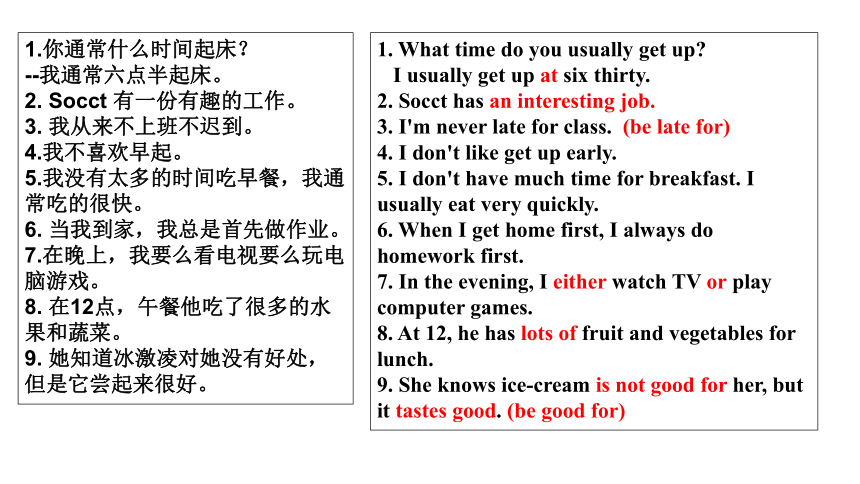
文档简介
(共13张PPT)
1. 下象棋
2. 弹吉他
3. 弹钢琴
4. 弹小提琴
5. 打鼓
6.说英语
7. 讲故事
8. 写故事
9. 擅长做某事
10. 擅长与某人相处
11. 游泳俱乐部
12. 在某方面帮助
1. play chess
2. play the guitar
3. play the piano
4. play the violin
5. play the drums
6. speak English
7. tell stories
8. write stories
9. be good at sth/doing
10. be good with sb
11. the swimming club
12. help sb with sth
13. 交朋友
14. 练功夫
15. 在周末
13. make friends
14. do kungfu
15. on the weekend
七下Unit 1
1.你想加入什么俱乐部?
我想加入体育俱乐部。
2. 他擅长说英语。
3. 他会下象棋吗?不,他不会。
4. 你很擅长讲故事。你可以加入讲故事俱乐部。
5. 我们需要你在体育方面为说英语的学生提供帮助。
6.放学后你忙吗 / 在七月你有空吗
7.你在周末有时间吗?
1. What club do you want to join
I want to join the sports club.
2. He is good at speaking English.
3. Can he play chess No, he can't.
4. You're very good at telling stories. You can join the story telling club.
5. We need you to help with sports for English-speaking students.
6. Are you busy after school / Are you free in July
7. Do you have time on the weekend
join 加入,参加,此处指加入社团或组织,成为其中的成员。
例: join the army 参军 join the party 入党
2. be good at sth./doing sth….表示擅长于…,后接名词或动词的-形式。
例: Tony is good at playing soccer.
be good with…表示“善于应付的,对…有办法”
例: The teacher is good with children.
be good to sb 和...某人友好, be good for...对某人有益处
3. tell stories 讲故事 tell you stories 给你讲故事
the story telling club 讲故事俱乐部
4. speak English/Chinese 说英语/汉语 speak to you 跟你说话
talk to/with you 和你交谈 say+说话的内容,sb say…,某人说…
tell 讲述 告诉 tell sb (not) to do sth 告诉某人做某事
5. make friends (with sb.) (和某人)交朋友
例:I want to make friends with all the students.
6. help (sb) with…表示“在某方面给予帮助”,其后接名词或名词短语。Can you help me with my English 你能帮帮我的英语吗?
拓展:help sb do sth. 帮助某人做某事
例:Can you help me learn English
一、日常生活起居的短语
1. 起床
2. 去上学
3. 穿衣服
4. 刷牙
5. 吃早餐
6. 洗澡
7. 回家
8. 打扫房间
9. 散步
10.去上班
11. 一份有趣的工作
1. get up
2. go to school
3. get dressed
4. brush teeth
5. eat breakfast
6. take a shower
7. go home
8. clean the room
9. take a walk
10. go to work
11. an interesting job
2.常见频度副词辨析:
always(100%)总是>usually通常>often经常>sometimes有时候>seldom很少>hardly几乎不>never(0%)从不
3. 时间的表达法:(1) 整点表达 小时+o'clock
(2) 顺读法 先读小时再读分钟 例:9:15 nine fifteen
(3)逆读法 先读分钟再读小时
15' a quarter past +小时 例:2:15 a quarter past two
30' half past +小时 3:30 half past three
45' a quarter to +小时+1 5:45 a quarter to six
4. GF What time/When 提问时间&用一般现在时表达日常行为(注意三单)
Rick几点吃早饭?他在七点吃早饭。
5.P11 2b句子:
放学后,我通常打半小时篮球。
在晚上,我要么看电视,要么玩电脑游戏。
她知道这对她不好,但是它尝起来好吃.
1.你通常什么时间起床?
--我通常六点半起床。
2. Socct 有一份有趣的工作。
3. 我从来不上班不迟到。
4.我不喜欢早起。
5.我没有太多的时间吃早餐,我通常吃的很快。
6. 当我到家,我总是首先做作业。
7.在晚上,我要么看电视要么玩电脑游戏。
8. 在12点,午餐他吃了很多的水果和蔬菜。
9. 她知道冰激凌对她没有好处,但是它尝起来很好。
1. What time do you usually get up
I usually get up at six thirty.
2. Socct has an interesting job.
3. I'm never late for class. (be late for)
4. I don't like get up early.
5. I don't have much time for breakfast. I usually eat very quickly.
6. When I get home first, I always do homework first.
7. In the evening, I either watch TV or play computer games.
8. At 12, he has lots of fruit and vegetables for lunch.
9. She knows ice-cream is not good for her, but it tastes good. (be good for)
1.乘坐地铁
2.乘坐公交汽车
3.骑自行车
4.步行
5.到家
6.到学校
7.每天
8.火车站
9.公共汽车站
10.认为
11.实现;成为现实
12..滑铁索
13.在..和...之间
14.过河
15.一个11岁的男孩
1.take the subway/by subway
2.take the bus/by bus
3.ride a bike
4.on foot
5.get home
6.get to school
7.every day
8.train station
9.bus stop
10.think of
11.come true
12. go on a ropeway
13.between...and...
14. cross the river
15. an 11-year-old boy
语法1.祈使句四种基本句型
(1)Be型(Be+形容词) 否定句:________+be+表语+其他 如:请安静。_______________. 别吵闹______________.
(2)Do 型(动词原形+宾语) 否定句:_______+________+宾语+其他
如:起立!Stand up! 关门!Close the door! 别跑!Don't run!
(3)Let型(Let sb. do sth.) 否定句:Let sb. not do.
如:让我来帮助你______________ __. 我们别看电视了_________________.
(4)No+doing型(意为“禁止做某事”) 如:禁止吸烟_____________ 禁止停车:______________.
课本熟背:5min
P19 1a 1. 不要上课迟到。你必须准时!3. 不要在教室里吃东西。你必须在餐厅吃。
4. 在课堂上不要听音乐!
P20 2a 6. 出去吃饭 7. 戴帽子
P20 2d (第二行)这是所很棒的学校,但是有很多规则。
(第六行)我们总是不得不穿校服。
(最后一行)我们得在图书馆保持安静。
Don’t
Be quiet, please.
Don’t be noisy.
动词原形
Let me help you
Let's not watch TV
No smoking.
Unit4 Don't eat in class
Don’t
话题:规则 Rules
No parking.
语法2.情态动词can, must, have to的用法
情态动词 含义 后加… 有无形式变化
can
must
have to
能力(U1);
许可,请求(U4)
必须
不得不,得
动词原形
动词原形
动词原形
无
无
has to/ had to
P23 2b课文句子背诵(熟练书写):5min
左:
第一段1. 马上起床,并把床铺好! 2. 别把脏盘子留在厨房! 3. 不要吵闹。
第二段1. 晚饭后,我也不能休息。 2. 但我不得不在十点前上床睡觉。 3. 糟糕透了。
右:倒数第四行:父母和学习有时候很严格,但请记住,他们制定规则是为了帮助我们。我们得遵守它们。 祝好运!
单词表背诵:打架;难过的;重要的;带来-过去式;安静的;外出;练习;清洗餐具;对某人严格;头发;学会
Unit5 Why do you like pandas (描述你喜欢的动物以及原因)
单词表背诵:1. 动物/动物园/熊猫/老虎/大象/狮子/长颈鹿/宠物/猫 2. 可爱的/懒散的/聪明的/美丽的/吓人的/友好的/害羞的 3.澳大利亚,睡觉,旗帜,危险n.,超过
GF背诵:1. kind of : 稍微;有点;后面加形容词 It is kind of cute.
a kind of一种 all/different kinds of 各种各样的
2.来自 be from=come from
He is from China. Is he from China He is not from China.
He comes from China. Does he come from China He doesn't come from China.
3. 你为什么喜欢熊猫?因为他们有点有趣。
狮子来自哪里?它们来自南非。
2d句子:Para1 大象是泰国的象征之一。 这是一种好运的象征。
Para2 它们也能画得非常好。 大象永不遗忘。 大象可以走很久,并且不会迷路。
Para3 但是大象正濒临灭绝。 人们砍倒很多树,所以大象正在失去他们的家园。
人们也因为象牙而杀害大象。 我们必须拯救树木,并且不购买象牙制品。
125分以上的同学背诵U5 2b课文 学会介绍大象,呼吁人们保护大象
Unit6 I'm watching TV.
P31话题:人们此时此刻正在干什么
GF背诵:你现在在干什么? 我正在看电视。
他现在在读报纸吗? 是的。/不,他正在打篮球。
他们正在使用电脑吗? 是的。/不,他们正在锻炼。
现在进行时:现在正在进行的动作。结构:am/is/are(not)+ doing, 标志词:now, right now, Look!Listen!It's 5 o'clock,
P32 2d句子 没什么,我只是在洗衣服。你呢?
你想和我共进晚餐吗?我父母都不在家。我们可以出去吃。
是的,我愿意。
P35 2b Para1 他现在正在美国学习。他的爸爸和叔叔正在看电视上的龙舟比赛。
Para2 朱辉也在看比赛、吃粽子吗?
但是在美国,并没有端午节,因此对于朱辉和他的寄宿家庭来说,今天就和任何别的夜晚一样。
他正在电话上和他深圳的表弟聊天呢。
朱辉十思念他的家人,也很想吃他妈妈做的美味的粽子。
朱辉也十分喜欢纽约和他的寄宿家庭,但仍旧“没有地方像家一样”
单词表背诵:做汤;去电影院;房子;喝茶;明天;泳池;商店;超市;男人-复数;年轻的;儿童-复数;客厅
asking
studying
arriving
beginning
动词如何变现在分词:
1. 下象棋
2. 弹吉他
3. 弹钢琴
4. 弹小提琴
5. 打鼓
6.说英语
7. 讲故事
8. 写故事
9. 擅长做某事
10. 擅长与某人相处
11. 游泳俱乐部
12. 在某方面帮助
1. play chess
2. play the guitar
3. play the piano
4. play the violin
5. play the drums
6. speak English
7. tell stories
8. write stories
9. be good at sth/doing
10. be good with sb
11. the swimming club
12. help sb with sth
13. 交朋友
14. 练功夫
15. 在周末
13. make friends
14. do kungfu
15. on the weekend
七下Unit 1
1.你想加入什么俱乐部?
我想加入体育俱乐部。
2. 他擅长说英语。
3. 他会下象棋吗?不,他不会。
4. 你很擅长讲故事。你可以加入讲故事俱乐部。
5. 我们需要你在体育方面为说英语的学生提供帮助。
6.放学后你忙吗 / 在七月你有空吗
7.你在周末有时间吗?
1. What club do you want to join
I want to join the sports club.
2. He is good at speaking English.
3. Can he play chess No, he can't.
4. You're very good at telling stories. You can join the story telling club.
5. We need you to help with sports for English-speaking students.
6. Are you busy after school / Are you free in July
7. Do you have time on the weekend
join 加入,参加,此处指加入社团或组织,成为其中的成员。
例: join the army 参军 join the party 入党
2. be good at sth./doing sth….表示擅长于…,后接名词或动词的-形式。
例: Tony is good at playing soccer.
be good with…表示“善于应付的,对…有办法”
例: The teacher is good with children.
be good to sb 和...某人友好, be good for...对某人有益处
3. tell stories 讲故事 tell you stories 给你讲故事
the story telling club 讲故事俱乐部
4. speak English/Chinese 说英语/汉语 speak to you 跟你说话
talk to/with you 和你交谈 say+说话的内容,sb say…,某人说…
tell 讲述 告诉 tell sb (not) to do sth 告诉某人做某事
5. make friends (with sb.) (和某人)交朋友
例:I want to make friends with all the students.
6. help (sb) with…表示“在某方面给予帮助”,其后接名词或名词短语。Can you help me with my English 你能帮帮我的英语吗?
拓展:help sb do sth. 帮助某人做某事
例:Can you help me learn English
一、日常生活起居的短语
1. 起床
2. 去上学
3. 穿衣服
4. 刷牙
5. 吃早餐
6. 洗澡
7. 回家
8. 打扫房间
9. 散步
10.去上班
11. 一份有趣的工作
1. get up
2. go to school
3. get dressed
4. brush teeth
5. eat breakfast
6. take a shower
7. go home
8. clean the room
9. take a walk
10. go to work
11. an interesting job
2.常见频度副词辨析:
always(100%)总是>usually通常>often经常>sometimes有时候>seldom很少>hardly几乎不>never(0%)从不
3. 时间的表达法:(1) 整点表达 小时+o'clock
(2) 顺读法 先读小时再读分钟 例:9:15 nine fifteen
(3)逆读法 先读分钟再读小时
15' a quarter past +小时 例:2:15 a quarter past two
30' half past +小时 3:30 half past three
45' a quarter to +小时+1 5:45 a quarter to six
4. GF What time/When 提问时间&用一般现在时表达日常行为(注意三单)
Rick几点吃早饭?他在七点吃早饭。
5.P11 2b句子:
放学后,我通常打半小时篮球。
在晚上,我要么看电视,要么玩电脑游戏。
她知道这对她不好,但是它尝起来好吃.
1.你通常什么时间起床?
--我通常六点半起床。
2. Socct 有一份有趣的工作。
3. 我从来不上班不迟到。
4.我不喜欢早起。
5.我没有太多的时间吃早餐,我通常吃的很快。
6. 当我到家,我总是首先做作业。
7.在晚上,我要么看电视要么玩电脑游戏。
8. 在12点,午餐他吃了很多的水果和蔬菜。
9. 她知道冰激凌对她没有好处,但是它尝起来很好。
1. What time do you usually get up
I usually get up at six thirty.
2. Socct has an interesting job.
3. I'm never late for class. (be late for)
4. I don't like get up early.
5. I don't have much time for breakfast. I usually eat very quickly.
6. When I get home first, I always do homework first.
7. In the evening, I either watch TV or play computer games.
8. At 12, he has lots of fruit and vegetables for lunch.
9. She knows ice-cream is not good for her, but it tastes good. (be good for)
1.乘坐地铁
2.乘坐公交汽车
3.骑自行车
4.步行
5.到家
6.到学校
7.每天
8.火车站
9.公共汽车站
10.认为
11.实现;成为现实
12..滑铁索
13.在..和...之间
14.过河
15.一个11岁的男孩
1.take the subway/by subway
2.take the bus/by bus
3.ride a bike
4.on foot
5.get home
6.get to school
7.every day
8.train station
9.bus stop
10.think of
11.come true
12. go on a ropeway
13.between...and...
14. cross the river
15. an 11-year-old boy
语法1.祈使句四种基本句型
(1)Be型(Be+形容词) 否定句:________+be+表语+其他 如:请安静。_______________. 别吵闹______________.
(2)Do 型(动词原形+宾语) 否定句:_______+________+宾语+其他
如:起立!Stand up! 关门!Close the door! 别跑!Don't run!
(3)Let型(Let sb. do sth.) 否定句:Let sb. not do.
如:让我来帮助你______________ __. 我们别看电视了_________________.
(4)No+doing型(意为“禁止做某事”) 如:禁止吸烟_____________ 禁止停车:______________.
课本熟背:5min
P19 1a 1. 不要上课迟到。你必须准时!3. 不要在教室里吃东西。你必须在餐厅吃。
4. 在课堂上不要听音乐!
P20 2a 6. 出去吃饭 7. 戴帽子
P20 2d (第二行)这是所很棒的学校,但是有很多规则。
(第六行)我们总是不得不穿校服。
(最后一行)我们得在图书馆保持安静。
Don’t
Be quiet, please.
Don’t be noisy.
动词原形
Let me help you
Let's not watch TV
No smoking.
Unit4 Don't eat in class
Don’t
话题:规则 Rules
No parking.
语法2.情态动词can, must, have to的用法
情态动词 含义 后加… 有无形式变化
can
must
have to
能力(U1);
许可,请求(U4)
必须
不得不,得
动词原形
动词原形
动词原形
无
无
has to/ had to
P23 2b课文句子背诵(熟练书写):5min
左:
第一段1. 马上起床,并把床铺好! 2. 别把脏盘子留在厨房! 3. 不要吵闹。
第二段1. 晚饭后,我也不能休息。 2. 但我不得不在十点前上床睡觉。 3. 糟糕透了。
右:倒数第四行:父母和学习有时候很严格,但请记住,他们制定规则是为了帮助我们。我们得遵守它们。 祝好运!
单词表背诵:打架;难过的;重要的;带来-过去式;安静的;外出;练习;清洗餐具;对某人严格;头发;学会
Unit5 Why do you like pandas (描述你喜欢的动物以及原因)
单词表背诵:1. 动物/动物园/熊猫/老虎/大象/狮子/长颈鹿/宠物/猫 2. 可爱的/懒散的/聪明的/美丽的/吓人的/友好的/害羞的 3.澳大利亚,睡觉,旗帜,危险n.,超过
GF背诵:1. kind of : 稍微;有点;后面加形容词 It is kind of cute.
a kind of一种 all/different kinds of 各种各样的
2.来自 be from=come from
He is from China. Is he from China He is not from China.
He comes from China. Does he come from China He doesn't come from China.
3. 你为什么喜欢熊猫?因为他们有点有趣。
狮子来自哪里?它们来自南非。
2d句子:Para1 大象是泰国的象征之一。 这是一种好运的象征。
Para2 它们也能画得非常好。 大象永不遗忘。 大象可以走很久,并且不会迷路。
Para3 但是大象正濒临灭绝。 人们砍倒很多树,所以大象正在失去他们的家园。
人们也因为象牙而杀害大象。 我们必须拯救树木,并且不购买象牙制品。
125分以上的同学背诵U5 2b课文 学会介绍大象,呼吁人们保护大象
Unit6 I'm watching TV.
P31话题:人们此时此刻正在干什么
GF背诵:你现在在干什么? 我正在看电视。
他现在在读报纸吗? 是的。/不,他正在打篮球。
他们正在使用电脑吗? 是的。/不,他们正在锻炼。
现在进行时:现在正在进行的动作。结构:am/is/are(not)+ doing, 标志词:now, right now, Look!Listen!It's 5 o'clock,
P32 2d句子 没什么,我只是在洗衣服。你呢?
你想和我共进晚餐吗?我父母都不在家。我们可以出去吃。
是的,我愿意。
P35 2b Para1 他现在正在美国学习。他的爸爸和叔叔正在看电视上的龙舟比赛。
Para2 朱辉也在看比赛、吃粽子吗?
但是在美国,并没有端午节,因此对于朱辉和他的寄宿家庭来说,今天就和任何别的夜晚一样。
他正在电话上和他深圳的表弟聊天呢。
朱辉十思念他的家人,也很想吃他妈妈做的美味的粽子。
朱辉也十分喜欢纽约和他的寄宿家庭,但仍旧“没有地方像家一样”
单词表背诵:做汤;去电影院;房子;喝茶;明天;泳池;商店;超市;男人-复数;年轻的;儿童-复数;客厅
asking
studying
arriving
beginning
动词如何变现在分词:
